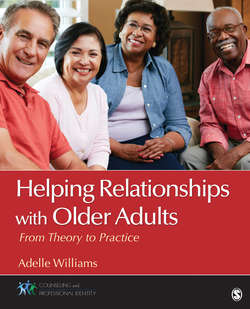Читать книгу Helping Relationships With Older Adults - Adelle M. Williams - Страница 57
На сайте Литреса книга снята с продажи.
Differences in the Baby Boomer Generation
ОглавлениеA number of differences exist between the baby boomers and previous generations. Baby boomers are in better physical health than the generations preceding them (Zapolsky, 2003). They hold vastly different worldviews because they have been raised in a country at relative peace and have not faced a global war. Furthermore, unlike any prior generation, their worldviews have been expanded by mass media, technological advances, and world travel.
Fewer tragedies and family sacrifices were the goals set by their parents for the baby boomers, which were believed possible because their parents were America’s Greatest Generation—strong, courageous, and self-reliant. The baby boomers grew up differently than their parents did. They are more affluent than their parents, perhaps because of their education, their courage, their ingenuity, or a combination of these (Vaillant, 2003). This group has not experienced the same struggles as their parents, such as the deprivations brought by the Great Depression. Although these differences make them unique, these same differences will affect the needs of those baby boomers who will reach their 60s in this decade and the future concerns of the baby boomers who are in their early 50s. Case Illustration 2.3 highlights some of the challenging aspects experienced by persons of the older generation.
Case Illustration 2.3
Mr. Jones grew up during the 1930s and experienced the Great Depression. Older persons today who grew up during this period are a distinct group and were shaped by the events and experiences in their youth. Mr. Jones was from a middle-class family and enjoyed the luxury of having nice clothes, a nice home, vacations, allowances, and several cars in their garage. They had family dinners, and he was able to attend a reasonable private school in his neighborhood. He recalled his life changing during the Great Depression because his family lost everything. They lost their jobs, their home, their cars, eliminated vacations, and Mr. Jones was enrolled in the public school within his neighborhood. His family did everything and sold everything to put food in his mouth, and while not nutritious by today’s standards, it kept him from going hungry.
Mr. Jones’s daughter is concerned because he is stockpiling canned goods, dry goods, newspapers, and a host of other items. He is what she calls “stingy,” and while he has money from a pension and savings, he refuses to spend his money. He hides his money in mattresses, linings of curtains, shoeboxes, dresser drawers, tips of shoes, and is paranoid regarding banks. Other than this type of behavior, he does well in maintaining himself, but he has begun hoarding more items and refuses to sign living wills, advance directives, or any documents she feels would be beneficial due to his advanced age. She is accompanying him to his primary physician, whom he has been seeing for the past 30 years, for an evaluation.
Considering when Mr. Jones was born, do you feel he is exhibiting unusual behavior, or is this behavior appropriate for his cohort and life experiences? Conduct research on the life experiences of those persons born during the Great Depression and see if there are connections to Mr. Jones’s current behavior. How would you, as a future practitioner, address the concerns that the daughter perceives as hoarding and refusal to spend money? How do you feel regarding his behavior, considering what you have learned from your research?
Baby boomers have been socially constructed in both positive and negative ways. They have been portrayed as aging hippies who “sold out” and became materialistic yuppies (Brooks, 2000) and as greedy and narcissistic (Okrent, 2000). Others challenge these portrayals (Freedman, 2002; Green, 2003; Steinhorn, 2006). Critics have pushed a distinctive ageism about boomers that links them to an unpatriotic image from the 1960s with traditional negative images of aging (Green, 2003). Steinhorn (2006) sees boomers as the greatest generation and rejects the notion that they are selfish; rather, he equates them with positive social change. Freedman (2002) paints an optimistic portrayal of boomers as favoring encore careers that bring idealism into extended working lives.
Regardless of the social construction of the baby boomer generation, one must always consider individual differences to avoid stereotyping and misrepresenting this group. The baby boomers are extremely conversant with many divergent ideas and dissenting values. This generation is characterized by not feeling old and, often, not looking or acting old. Nothing that was assumed about age in the past will fit this group. Just as their parents were shaped by the Great Depression of the 1930s, boomers were shaped by the great affluence of the post-war decades and later by the Great Recession of 2008.
